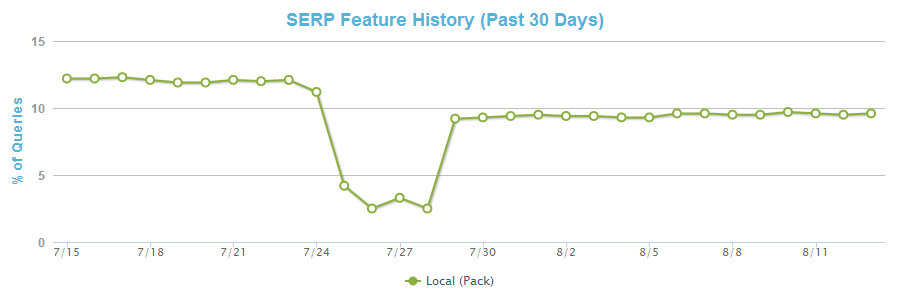Penguin, Panda, Hummingbird, and… Pigeon?!
Google’s latest search algorithm update was released on July 24, but without an official title. The staff of the news hub Search Engine Land took it upon themselves to name the update “Pigeon,” a potentially comical decision given the relatively unfavorable public opinion of the park bench defiler. Name choice aside, this was a significant update that deserves proper attention as it impacts both Google Maps and Google Web.
So, what is Pigeon? According to Search Engine Land’s Barry Schwartz, “Google told us that the new local search algorithm ties deeper into their web search capabilities, including the hundreds of ranking signals they use in web search along with search features such as Knowledge Graph, spelling correction, synonyms and more. In addition, Google said that this new algorithm improves their distance and location ranking parameters.”
Reports that the Google Local 7 Pack – the search results that show a business’ name, address, phone number, and map (so called because it used to list seven locations) – has seemingly ”flown the coop” are continuing to surface, and many are debating whether this change is good or bad for local businesses. The morning after Pigeon was rolled out, MozCast reported a sixty percent decline in queries showing the Local 7 Pack. Since then, that percentage seems to have improved, but not to the extent seen before Pigeon.
 As Mike Blumenthal notes, ”There also appears to be less duplication of results in both the 7-Pack and the organic where the order of the organic and local results mirrored each other.” In other words, there seems to be less of a chance that a #1 organic result will also be found in the #1 position in the 7 Pack, though The Google Local Carousel looks to be unaffected by Pigeon.
As Mike Blumenthal notes, ”There also appears to be less duplication of results in both the 7-Pack and the organic where the order of the organic and local results mirrored each other.” In other words, there seems to be less of a chance that a #1 organic result will also be found in the #1 position in the 7 Pack, though The Google Local Carousel looks to be unaffected by Pigeon.
It’s also important to note that this update was rolled out for US English results only. There is no news as to when or if it will be applied to other languages or countries. With that being said, the easiest way to see the before and after effects is by performing the same search on Google.ca and Google.com.
First, let’s look at the before by doing a search for ”sushi restaurant” on Google.ca.
- Yelp.ca is the first organic result.
- Images are below the first result.
- Three organic results appear above local results.
- The familiar 7Pack is shown.
- The #1 and #2 organic results match the #1 and #2 local results.
- Nine organic results appear.
- News results appear at the bottom and show a snippet for only the first result.
- Only the first five organic results are related to restaurants that are truly nearby.
 Now let’s evaluate the after by performing the same search on Google.com
Now let’s evaluate the after by performing the same search on Google.com
- Images are at the very top of the page.
- Only one organic result appears above local results.
- No 7 Pack is shown; instead, only three local results are.
- The #1 organic result is the #2 local result.
- Nine organic results appear.
- Instead of News results at the bottom, “In-depth articles” appear.
- Six of the nine organic results are related to restaurants that are truly nearby.
As mentioned previously, this change does not affect all local businesses, so results will vary. I tested the differences across several searches such as ”Ford dealership,” ”Chrysler dealers,“ and ”yoga studio,” all of which returned different results.
In addition, users are noticing that other local directories now appear higher in Google’s search results. This may be due to a recent ordeal with Yelp, in which Yelp allegedly states that Google manipulates search results in order to favor G+ local content over Yelp content. A study was conducted and leaked to TechCrunch, which caused quite a commotion across the Internet. The shift from individual business websites to directory listings doesn’t happen with every search query, or even within verticals, but it could very well be a future trend as Google’s local search algorithm evolves.
It’s clear that there is still a large amount of research and investigation needed in order to truly understand the effects of Pigeon. As is the case with all of Google’s algorithms and updates, little information has been provided and we should not expect that to change. Still, the most disconcerting part of this update is the inconsistency across results.
As of today it seems that no one can confirm at least one vertical or type of query that consistently displays the ”new” results. All search marketing professionals mention ”most” or “some” when discussing their findings and theories, but there is no mention of the word “all.” With limited information to help direct their local optimization tactics and no knowledge of the future of this algorithm, businesses and experts are both left stumbling blindly.
- Mimi Naghshineh, SEO & Content Manager
The post Penguin, Panda, Hummingbird, and… Pigeon?! appeared first on Search Optics Blog.

